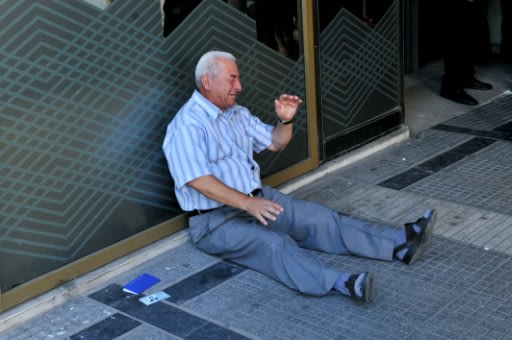 There are a item of news that has gone around the world, a nice story that gets the heart. Returning to the Greece topic, a 77-year-old elder after queuing in four banks in order to draw his 120-euro pension and find that he couldn't, directly he went down to the ground and started to cry of helplessness, later he was helped stand up while going on crying.
There are a item of news that has gone around the world, a nice story that gets the heart. Returning to the Greece topic, a 77-year-old elder after queuing in four banks in order to draw his 120-euro pension and find that he couldn't, directly he went down to the ground and started to cry of helplessness, later he was helped stand up while going on crying.This picture went around the world and an Australian citizen saw it and recognized him, this man on the ground was the friend of his father in the past, then he did everything he could to locate him and to help him. Isn't it incredible?
There IS aN item of news that has gone around the world, a nice story that gets/REACHES the heart. Returning to the Greece topic, a 77-year-old elder, after queuing in four banks in order to draw his 120-euro pension and find that he couldn't, directly [] went down to the ground(1) and started to cry WITH helplessness. Later he was helped TO stand up while going on crying.
ReplyDeleteThis picture went around the world and an Australian citizen saw it and recognized him. This man on the ground was the friend of his father in the past. Then he did everything he could to locate him and to help him. Isn't it incredible?
(1) better: sat on the floor
Yes, great story!
Let me ask you, as far as I know, "to" is optional with the "help" verb
ReplyDeleteHelp somebody (to) do something. So
"Later he was helped stand up" is wrong?
Great question! I had to think about it, and I'm not sure what the rule is. I think the "to" is optional in the active voice, so the following are correct:
ReplyDeleteHe helped me to stand up.
He helped me stand up.
But in the passive voice:
I was helped to stand up.
I was helped stand up. <= wrong
Let's try another example:
They will help us to wash the dishes.
They will help us wash the dishes.
We will be helped to wash the dishes.
We will be helped wash the dishes. <= wrong
At least, that's my theory for the moment! :-)
Thanks for spending your time teaching me.
ReplyDelete